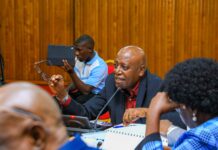First presented before Parliament in August 2019, the National Social Security Fund (NSSF) Amendment Bill, 2019 has generated controversy on issues regarding the mid-term access of funds, direct lending to government and whether the fund should revert to the ministry of Gender.
Parliament has halted its decision on the proposed mid-term access to benefits by contributors to the National Social Security Fund (NSSF) after legislators failed to agree on the group of people and percentage that should be availed.
This followed a debate on a joint committee report comprising members from the Finance and Gender committees in parliament who recommended that members aged above 45 and have saved for at least 10 years, be allowed to access their benefits.
This main report noted that the purpose of mid-term access was to provide for additional benefits and relief to members of the Fund before they reach the age prescribed by the law. Savings can only be accessed when a saver clocks 55, according to the current law.
The MPs also recommended that a person with a disability who lacks gainful employment or fails to generate income, and is unable to make contributions to the Fund for a period of not less than one year should access up to 75 per cent of their contributions upon application.
However in his minority report, Bulamogi County MP Kenneth Lubogo said that members who lose their employment and remain unemployed for a period of not less than three years, should also upon application be entitled to 40 per cent of the balance on their account.
These conflicting recommendations were further complicated by a motion by Busongora North MP William Nzoghu who wanted government to allow all contributors access 20 percent of their savings with the Fund in light of the economic distress caused by the Covid-19 pandemic.
“Contributors should not die of hunger leaving their savings to the survivors. NSSF has 1.5 million members who contribute over 1.8 trillion in savings annually and the Fund has over 11.2 trillion in assets. Availing members with their savings will help lessen the negative impact of Covid-19 to over 1.5 million households,” he said.
Nzoghu said that it was prudent for government to consider an amendment to the NSSF Act granting contributors 20 percent payments and lessen hardships on the households.
Speaker Kadaga then guided that Nzoghu’s motion together with reports on the Bill would be debated and handled at the same time.
During the debate, Soroti Woman MP Angelline Osegge supported Nzoghu’s proposal saying that the first responsibility of the Fund is to the savers and not government. She said that the law should be amended to enable people access 20 percent of their money.
Rukungiri Woman MP Betty Bamukwatsa also weighed in saying that this was the time Ugandans need their contributions to help them during the difficult time occasioned by the Covid-19 pandemic.
On the other hand, Soroti County MP Kenneth Esiangu suggested that the money be structured in age brackets and access be based on how long a person has been saved.
“We should let the people access between 20 and 30 percent, these payments won’t drain the Fund. Every member should get something to alleviate the current suffering,” he said.
But Worker’s MP Aston Rwakajara supported the main committee report saying that anyone who has saved for more than 10 years and is above 45 years should get at least 20 percent of their money. He appealed to his colleagues not to only focus on Covid-19 pandemic alone but allow mid-term access to address many other issues which may come in the future.
After failing to agree on a common position for mid-term access, Speaker Kadaga stood over the decision allowing MPs to debate other clauses in the Bill.
First presented before Parliament in August 2019, the National Social Security Fund (NSSF) Amendment Bill, 2019 has generated controversy on issues regarding the mid-term access of funds, direct lending to government and whether the fund should revert to the ministry of Gender.
But legislators also failed to agree with the Joint-Committee recommendation that the Fund should be supervised by both the Ministry of Finance and the Ministry of Gender, Labour and Social Development as advised by President Yoweri Museveni.
Despite pleas by the Minister of Gender Frank Tumwebaze and Minister of State for Planning David Bahati for the government position to be adopted, a section of MPs led by Dokolo Woman MP Cecilia Ogwal put up a protest saying that double accounting for funds could not be tolerated, and also questioning why the Gender Ministry is not solely allowed to manage and supervise the Fund.
The Fund is currently managed by the Ministry of Finance despite its relation to the Labour Ministry. Kadaga also ruled that the decision on this matter is stood over so that the concerns are considered next week.
Meanwhile, Parliament agreed and rejected the proposed direct lending by the National Social Security Fund (NSSF) to the government. This followed the committee members’ recommendation that this was intended to avoid abuse of member’s funds and conflict of interest.
MPs observed that NSSF already lends to the government and other entities using instruments prescribed in the Uganda Retirement Benefits Regulatory Authority (URBRA) Act & Regulations including, among others; Treasury Bills, Bonds and government securities. The members added that direct lending would instead contravene section 68 of the URBRA Act, 2011 which prohibits direct lending which is not through securities sold on the open market.


